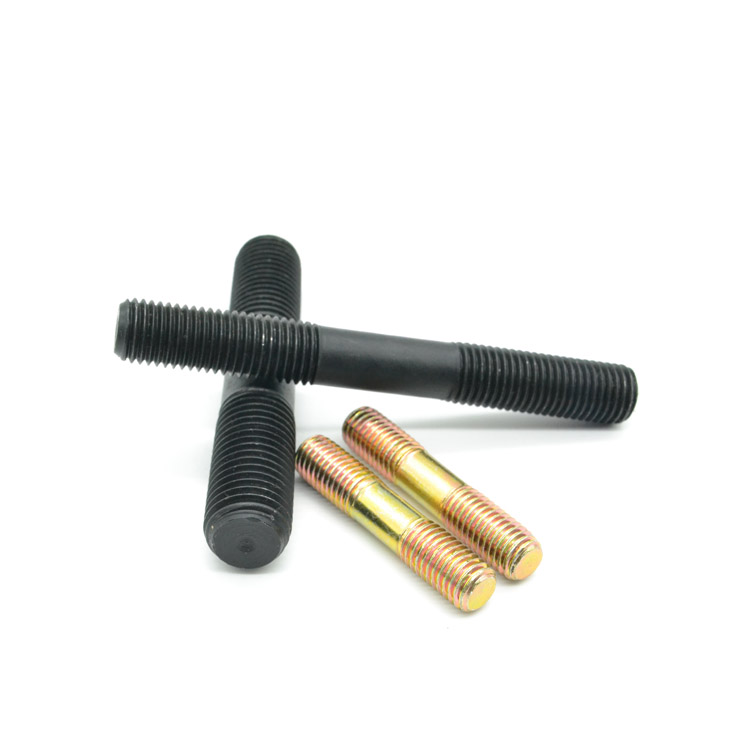
Bolts are foundational fasteners in construction, manufacturing, and mechanical projects, designed to join materials securely under tension. Whether you need general-purpose bolts, heavy-duty stud bolts for pressure vessels, cost-effective grade4.8 hex bolts for light loads, high-strength grade8.8 hex bolts for critical applications, or durable carbon steel hex bolts for versatility, each type is engineered to meet specific strength, material, and use-case requirements. These fasteners ensure structural integrity, making them indispensable in industries from automotive to aerospace.
Bolts are threaded fasteners designed to mate with nuts, creating a secure joint that can be disassembled (unlike rivets or welds). They come in countless sizes, head styles (hex, round, square), and thread types (coarse, fine), adapting to tasks ranging from assembling furniture to building bridges. Most
bolts feature a cylindrical shaft with external threads, a head for tool engagement (e.g., hex heads for wrenches), and often a shank (unthreaded portion) that distributes load evenly. Materials for
bolts vary by application: carbon steel for general use, stainless steel for corrosion resistance, and alloy steel for high-strength needs. In residential settings, small
bolts secure cabinets or appliances; in industrial settings, large
bolts hold heavy machinery or structural beams. Their versatility and reusability make
bolts a staple in any project where reliable, removable fastening is required.
A stud bolt is a specialized bolt without a head, featuring external threads on both ends—one end screws into a tapped hole (permanent side), while the other end accepts a nut (removable side) to clamp materials together. This design makes stud bolts ideal for applications where access to only one side of the joint is possible, or where frequent disassembly is needed (e.g., machinery maintenance). They excel in high-pressure, high-temperature environments like oil refineries, chemical plants, or power generation facilities, where they secure flanges, pressure vessels, or heat exchangers. Stud bolts distribute stress evenly across the joint, reducing the risk of leaks or loosening under extreme conditions. They’re available in materials like carbon steel, stainless steel, or alloy steel, and often paired with washers to enhance stability and prevent damage to clamped surfaces. For critical joints that demand reliability, stud bolts are the preferred choice over standard bolts.
Grade4.8 hex bolts are low-carbon steel bolts classified by the ISO 898-1 standard, where “4.8” indicates their mechanical properties: a minimum tensile strength of 400 MPa and a yield strength of 80% of that (320 MPa). These bolts feature a hexagonal head (easy to grip with wrenches) and coarse threads, making them suitable for light to medium-load applications where high strength isn’t the top priority. Grade4.8 hex bolts are typically zinc-plated or galvanized to resist mild corrosion, and they’re widely used in residential construction (securing wooden frames, drywall brackets), furniture assembly, and light machinery (small motors, equipment casings). Their low cost and easy availability make them a go-to for projects with budget constraints or non-critical joints. Unlike higher-grade bolts, they’re not designed for heavy loads or extreme conditions, but their reliability in everyday applications has solidified their place in workshops and job sites worldwide.
Grade8.8 hex bolts are medium-carbon alloy steel bolts (heat-treated for enhanced strength) that meet strict ISO 898-1 standards, with a minimum tensile strength of 800 MPa and a yield strength of 80% of that (640 MPa). Their hexagonal head design allows for high torque application, ensuring a tight, secure joint that resists loosening under vibration or heavy loads. Grade8.8 hex bolts are often black oxide-coated or galvanized for corrosion resistance, and they’re used in critical applications where failure could lead to safety risks or downtime—such as automotive drivetrains, heavy machinery (cranes, excavators), structural steel framing, and industrial equipment. Unlike grade4.8 hex bolts, they can withstand extreme pressure, temperature fluctuations, and repeated stress without deforming or breaking. Their high strength-to-weight ratio makes them indispensable in engineering and manufacturing, where structural integrity is non-negotiable.
Carbon Steel Hex Bolts are hex-headed bolts made from carbon steel—an alloy of iron and carbon (with small amounts of other elements like manganese)—known for its strength, durability, and affordability. These bolts combine the ease of use of a hexagonal head (compatible with standard wrenches and sockets) with the versatility of carbon steel, which can be heat-treated to adjust strength (e.g., grade4.8 or grade8.8) or coated to improve corrosion resistance (zinc, chrome, or epoxy). Carbon Steel Hex Bolts are used across industries: in construction, they secure steel beams and concrete forms; in manufacturing, they assemble machinery and tooling; in automotive, they fasten engine components and chassis parts. Uncoated carbon steel hex bolts are ideal for indoor, dry environments, while coated versions work in outdoor or damp settings (though not as corrosion-resistant as stainless steel). Their balance of strength, cost, and adaptability makes them one of the most widely used fasteners in the world.
A stud bolt has no head and is threaded on both ends (one end screws into a tapped hole, the other uses a nut), while a standard bolt has a head and is threaded on one end (mates with a nut on the other side). Stud bolts are better for one-sided access or frequent disassembly, while standard bolts work for two-sided access joints.
Choose grade4.8 hex bolts for light to medium loads (e.g., furniture, drywall) where cost is a factor. Use grade8.8 hex bolts for high-stress, critical applications (e.g., machinery, structural framing) that require higher tensile and yield strength to prevent failure.
Carbon steel hex bolts can be used outdoors if coated (zinc-plated, galvanized) to resist rust. However, they’re not as corrosion-resistant as stainless steel bolts—for long-term outdoor use in harsh conditions (saltwater, heavy rain), stainless steel is a better choice.
From general-purpose bolts to high-strength grade8.8 hex bolts, and specialized stud bolts to versatile carbon steel hex bolts, these fasteners form the backbone of secure, reliable joints in every industry. Choosing the right type ensures projects are safe, durable, and built to last.

